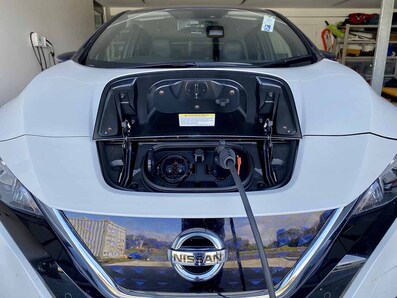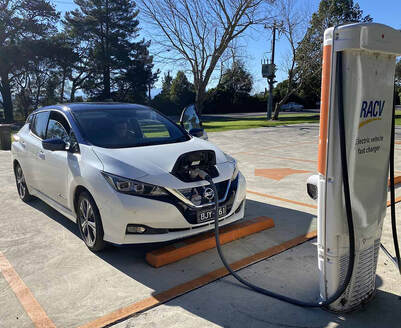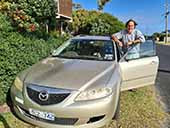 Michael Nugent asks four local EV pioneers about their experience of owning – and driving – an electric vehicle.
Michael Nugent asks four local EV pioneers about their experience of owning – and driving – an electric vehicle. BACK in March I wrote about the start of my Electric Vehicle (EV) journey. My Nissan Leaf arrived in June, and as I get to know its intricacies over the next few months I’ll write about my experience with it.
In the meantime, I’d like to share what some of the pioneer EV drivers in Bass Coast say they have discovered about going all-electric, which might help you fill in a few gaps if you are thinking of making the leap.
I asked Cassie Wright and Rob Gray (Nissan Leaf), Donald Ellsmore and Cheryl Padgett (Volvo XC40), Werner and Ursula Theinert (Nissan Leaf), and our Mayor, Cr Michael Whelan (Hyundi Kona) about their experiences. This is what I learned.
Jumping straight in the deep end: what’s the most important thing anyone thinking about buying an EV needs to know?
The consistent answer was to understand the difference between an EV and an ICE car (internal combustion engine) and remember to do a bit of planning before taking off. Fuelling an EV is not a simple matter of stopping for a few minutes to buy petrol at one of the zillion petrol stations between where you are and where you want to go.
“Whilst it is nice to not have to study the big illuminated fuel price signs at service stations, it was comforting to know they were there when needed during the days of diesel car ownership.” |
 Werner and Ursula Theinert top up the Leaf at Moe Folk Museum for
Werner and Ursula Theinert top up the Leaf at Moe Folk Museum for $6.50 – from 30 to 80% in about half an hour @50kWHr, for the home
run to Wonthaggi after a trip to Maffra and Glengarry and Morwell. “We probably would have made it home on the charge in the car, but it's a far better drive, knowing there's plenty in reserve.”
What’s the best thing about owning an EV?
The answers were split between the “feel-good” factor on one hand: knowing you’ve organised your personal transport as best you can to minimise your contribution to the mounting climate crisis; and the “petrol head” answer on the other: it’s a simple fact that as far as acceleration goes, a standard EV beats a standard ICE hands down every time.
Also, not having to pay for petrol ever again rates pretty highly, particularly as petrol price rises make the economics of driving an EV more and more appealing, as did the option of single-pedal driving – Nissan call this the e-pedal, a “way of including a gentle but effective braking effect (regenerative braking) on the accelerator pedal. You will very rarely need to use the brake pedal (which is why brakes pads last a very long time on EVs)”.
But it’s not all beer and skittles, so I also asked what is the worst thing about owning an EV? The clear winner again was range anxiety (or range hesitancy or uncertainty).
“It is important to calculate your day to day driving distance and make sure you buy a car that has twice that range” |
“Having driven the car for over 20,000kms, I'm still watching the Range figure constantly, even though I know I'll have around 100kms of range left after driving to Melbourne or the Latrobe Valley and back to the Bass Coast” |
Fortunately, we have a several rapid charging options in Bass Coast and the council will soon be installing four more as part of their plan to reach carbon neutrality by 2030. But another note of caution: if you will be reliant on a particular rapid charging station for a trip, it can pay to check beforehand that it is in working order (vandalism is a problem at some locations) and that the technology is compatible with your vehicle (it’s VHS versus Betamax all over again when it comes to the plugs – it’s not that hard to work out what you need but it does take a little doing at the start and you don’t want to be relying on a charger that doesn’t work with your particular vehicle).
What surprised you the most when you switch to an EV?
While everyone had done their homework before getting an EV and knew they could outperform most ICEs in a drag race, nearly all were surprised at how truly phenomenal the acceleration is (or can be, if you don’t use an “eco-switch” to limit it and save energy).
What disappointed you the most when you switched to an EV?
The only disappointments mentioned were not to do with the EVs themselves, but rather the slow rollout of: (a) any meaningful government policy on EVs, which has left us well behind where we could have been in terms of the types of car available and their price – relative to many other countries, there’s still not a lot to choose from and they are still more expensive than they should be; (b) rapid charging stations – depending on the size of your battery, this can be a particular problem if you want to go through Gippsland and up the south coast of NSW.
They are coming, but if you have an EV now, you need the chargers to be there now too; and (c) bi-directional charging, which I spoke about in my previous article – it allows you to charge your car for free on solar during the day then use it to power your home in the evening. Bi-directional charging technology operates fine overseas and is coming to Australia, but its not here yet.
What would you have done differently?
My favourite answer to this question was “Buy an EV earlier!”. A couple of people mentioned that they could have done more research before buying but then, on reflection, both said any trepidation they had about getting an EV was unfounded because they are totally happy with what they have, so more research would probably only have led them to the same conclusion.
The final question sums up the experience in one simple score that I believe says it all: on a scale of 1 (not at all) to 10 (ecstatic) – how pleased are you that you bought an EV? Apart from one self-declared “hard marker’’ who rated their experience “around 8”, all scores were between 9.5 and 11!
In other words, once they got over any teething difficulties, these EV pioneers are ecstatic about their decision to switch to an all-electric car.

March 9, 2022 - The old Mazda has served Michael Nugent well but he’s ready for the EV revolution. He invites us to join him on the journey.